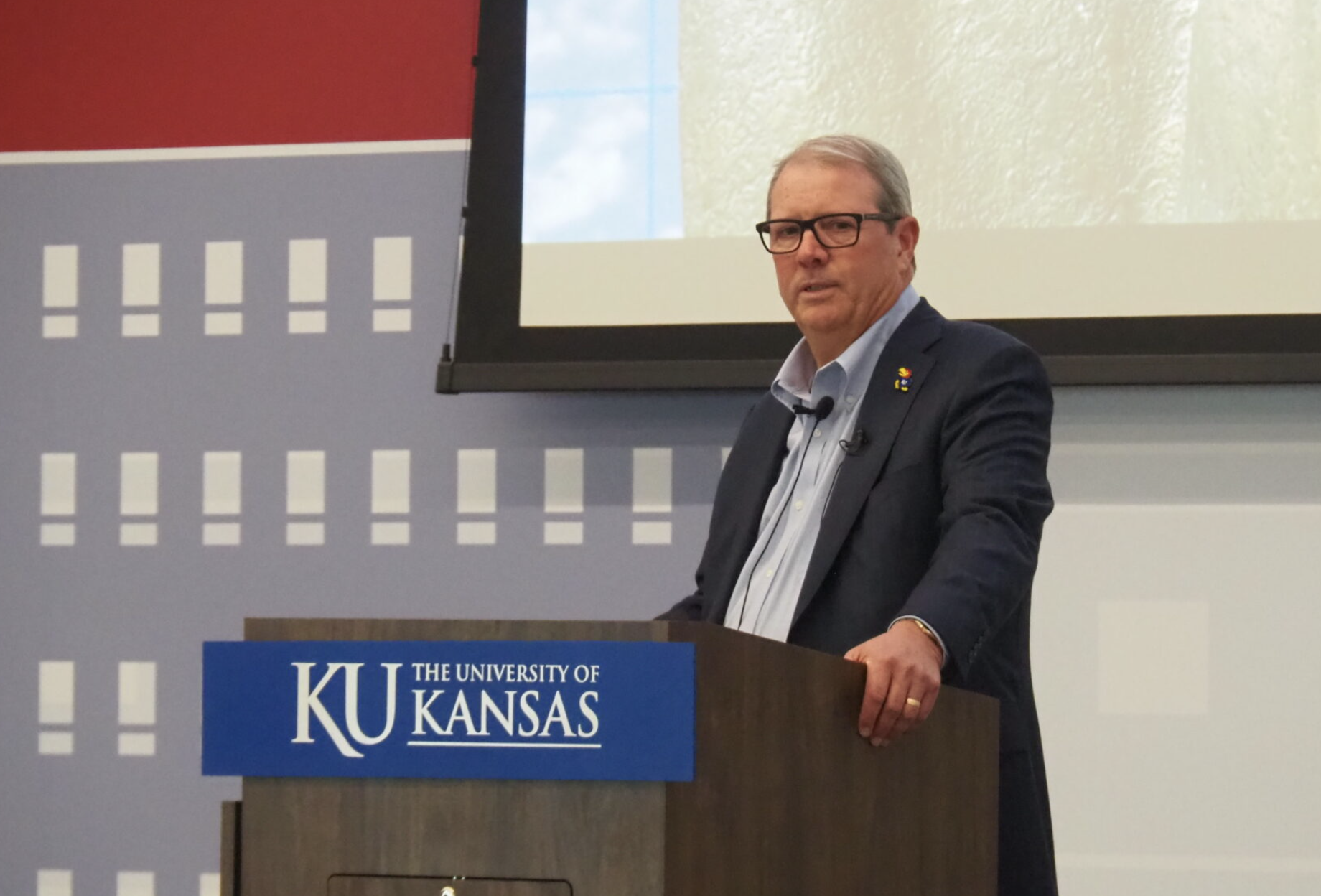
Girod described ‘productive’ dialogue on strategy to reshape colleges, universitie
TOPEKA — The University of Kansas said Monday the chancellor privately shared insights about a proposed compact offering preferential treatment by the Trump administration in exchange for freezing tuition rates, limiting international student enrollment and restraining campus employees from expressing political views.
KU Chancellor Doug Girod, vice chair of the prestigious Association of American Universities, responded to a request Friday to provide feedback on President Donald Trump’s unprecedented plan to bring higher education institutions into line with his agenda.
Seven of nine universities originally offered the Trump deal have rejected the offer, which was denounced in a statement by the American Council on Education and dozens of other education associations. KU’s last-minute role in a virtual meeting was sought along with that of Washington University in St. Louis, as well as Arizona State University. It wasn’t clear if KU was asked to sign the deal with Trump.
“Chancellor Girod was invited to provide feedback to federal officials on the Compact for Academic Excellence in Higher Education and related matters impacting universities,” said Erinn Barcomb-Peterson, director of media relations at KU. “The chancellor described the discussion as productive, and federal officials were interested in his perspective.”
After the meeting, Linda McMahon, secretary of the U.S. Department of Education, said on X that the gathering with Girod and others was “an important step toward defending a shared vision.”
“With continued federal investment and strong institutional leadership, the higher education sector can do more to enhance American leadership in the world and build tomorrow’s workforce,” she said. “A renewed commitment to the time-honored principles that helped make American universities great will strengthen the country and deepen public confidence in higher education.”

The White House convened the group ahead of Monday’s deadline for reaction and comment from nine private and public institutions — KU wasn’t on that list — initially contacted by the Trump administration. No institutions have signed the agreement.
On Saturday, Dartmouth President Sian Beilock issued a statement that said she shared on the call that “I do not believe that a compact — with any administration — is the right approach to achieve academic excellence, as it would compromise our academic freedom, our ability to govern ourselves and the principle that federal research funds should be awarded to the best, most promising ideas.”
Paul Mahoney, interim president of the University of Virginia, said a contract with the federal government predicating assessment of students on anything other than merit would erode confidence in U.S. higher education and threatened to undermine lifesaving research.
In addition to Dartmouth and UVA, the answer was “no” from Brown University, Massachusetts Institute of Technology, University of Pennsylvania, University of Southern California and University of Arizona. Vanderbilt University and University of Texas had yet to provide conclusive answers.
The Trump administration since taking office in January has blocked billions of dollars in research grants in an effort to compel operational changes at U.S. universities and colleges. Reasons for the budget cuts included alleged antisemitism on campus; policies ensuring LGBTQ+ equality; and programs tied to diversity, equity and inclusion.
Frustrated by pushback from higher education, the White House delivered letters Oct. 1 to select colleges and universities on the Compact for Academic Excellence in Higher Education. The strategy was to invite voluntary compliance with changes the Trump administration could have difficult enforcing.
The Trump administration’s compact would mandate that schools freeze tuition for five years, limit international students to 15% of undergraduate enrollment, impose standardized tests for admission, abide by a ban on DEI programs and adopt a definition of gender that would block transgender individuals from using restrooms or participating in sports that aligned with their gender identity.
In addition, the arrangement would forbid participating colleges and universities from allowing employees to express political views on behalf of their institutions. Academic departments offering opinions counter to views held by conservatives would have to be closed. Students and employees would be polled on compact compliance and the results released publicly. There would be financial penalties for institutions that violated pledges included in the deal.
Trump wrote on Truth Social that other colleges or universities beyond those contacted so far could be signers of the deal.
The American Council on Education’s statement, with 35 other organizations in opposition to the compact, said Trump’s maneuvering raised concern about undermining qualities that made the U.S. educational system exceptional.
“The compact offers nothing less than government control of a university’s basic and necessary freedoms — the freedoms to decide who we teach, what we teach and who teaches,” the statement said. “The compact is just the kind of excessive federal overreach and regulation, to the detriment of state and local input and control, that this administration says it is against.”
The joint statement said the proposed compact would hamper ability of colleges and universities to innovate and make advancements that contributed to the nation’s economic well-being and security.
“It would hinder, not safeguard, freedom of expression for all points of view, and it will not assist in expanding social and economic mobility for all of our students,” the statement read.





